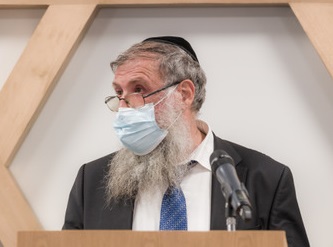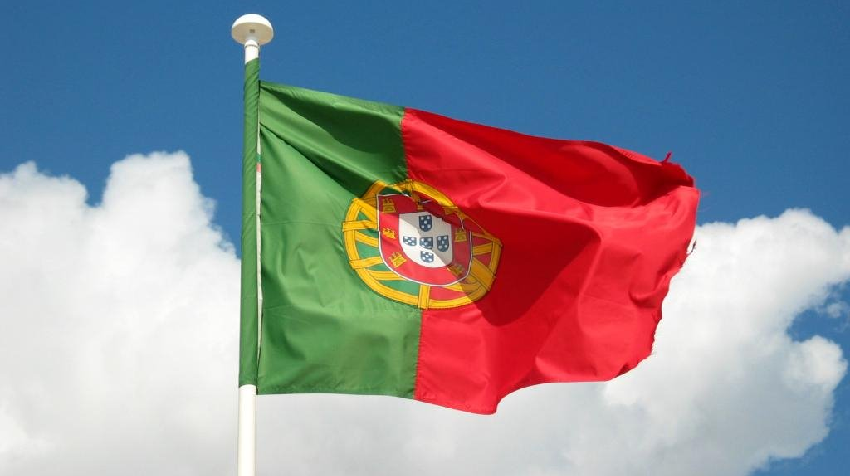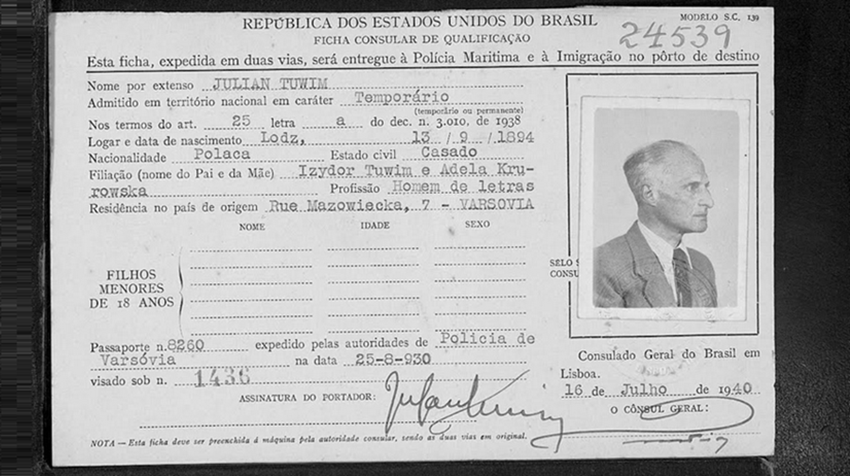What assessment do you make of the last years in terms of the law of the Sephardim?
Almost seven years have passed. The national Jewish community grew 1000% and many families are still preparing their journey. We see filled synagogues, museums, the Portuguese Jewish school, the greatest Chabad Centre in Europe, Jewish newspapers, kosher restaurants and many international events. So far, the State has probably granted about 50 thousand naturalization certificates to Jews of Sephardic origin. That makes up about 5% of the universe of possible candidates, which we reckon are more than one million, if we consider only the traditional families of Sephardic communities of North Africa and the former Ottoman Empire.
Why are the Jewish communities involved in the naturalization process?
In 2015, the government of the Social Democratic Party and the Christian Democratic Party considered that no one in Portugal except the Jewish communities was competent to certify the Sephardic nature of the applicants. It chose, on the one hand, the Jewish communities established in Portugal and, on the other, the communities of the applicants’ country of origin. In the latter case, the Registry would review the whole process and in case of doubt, the law advises that it should consult the Portuguese Jewish communities. This has happened on many occasions.
Does the Registry maintain regular contacts with the Oporto and Lisbon communities?
There has always been real-time cooperation between the Registry and the Jewish communities of Oporto and Lisbon. In all these years, we have always been in permanent contact with the Registry. Every month we send full and complete cases to registry offices around the country. There are innumerable cases presenting doubts, many on a single day, generally connected with minor but complex issues, such as the spelling of Hebrew last names, which differs from country to country, and which we always attempt to clarify by sending the applicants’ complete files.
Isn’t the certificate of Sephardic origin overrated in a nationality process?
The Registry reviews a vast number of documents, including not only a certificate of Sephardic origin, but also many others, as well as proof of Sephardic origin. As far as I know, the Registry’s global review terminates with the elaboration of an opinion, which may be positive or negative. The government decides whether or not to grant nationality to each applicant. It is a discretionary power. In 2013, when two similar drafts were brought before Parliament, the draft presented by the Socialist Party, which said, “The government may grant”, took precedence over the draft of the Christian Democratic Party, which said, “The government grants”.
Do you believe that the law might be altered in the near future?
That is always a legislative possibility. We will not fight it. We only fight offenses, not legislative choices of the sovereign power. We never demanded this law, much less did we ask to be part of it. In 2013 and 2014, we asked the government to set up an international commission to certify Sephardic Jews. We did not want to be the ones to do it, to avoid being criticized for it.
Why criticized?
We know the history of Portugal. In common parlance, an evil thing is “a judiaria". How can we fight this ancient mistrust, particularly in a time when everyone distrusts everybody else? We could never satisfy everyone who demanded absolute proof that a Moroccan or Ottoman family had once left Évora or Penafiel. How to provide definitive proof that Dr. Jorge Sampaio, former President of the Republic, had originated in Portugal? That is only proven by Jewish tradition, anchored of course in rabbinical certificates, last names, countries and other issues that are relevant to those who know the Jewish world. This would never satisfy the critics, they do not even know what a Jew is.
Yet the Portuguese law requires a tradition of belonging.
It requires a tradition of belonging not to Portugal but to a Sephardic community of Portuguese origin, in Tangiers, Tunis, Cairo, Istanbul, Antwerp, etc. I was always positively surprised by this step of the law – the tradition of belonging – coming from non-Jewish legislators. Within the Jewish people – a people of forced migrants – the proof of each one’s qualities is provided in accordance with Jewish tradition. That is how migration to Israel works. The Jewish tradition is the major defender of the synagogues of the world, of Israel and Portugal.
The nationality law is soon to be altered. Do you know how?
We do not. We suggest a more effective connection between the applicants and Portugal, to prevent unlawful publicity, as well as an electronic platform so that we can work together with the Registry. We are adamant on this point. We have very little interest in continuing to work as we have done in these last seven years, with Latin America calling us racists and with disparagers of the law saying that we have certified huge amounts of cases … and again, I say that these are only about 5% of the potential universe of candidates in the Portuguese Sephardic world.
What are the certification criteria of the Jewish Community of Oporto?
As agreed with the Justice Ministry in 2015, the Oporto community certifies the Jews descended from Sephardic Jews from communities of Portuguese origin, grounded in its knowledge of the Jewish world and its institutions and basing its decisions on Jewish tradition, family last names, family language, countries, family memories, certificates issued by the Jewish communities to which the applicants belong, official State documents and other factors considered throughout the evaluation process.
How do you analyze a genealogical tree?
As we understand the law, something that has always been accepted by the Justice Ministry, the connection to the Jewish world must be current and involve a tradition of belonging to a Sephardic community of Portuguese origin, which the law, and rightly so, places in various parts of the world. This means that we do not need a genealogy going back many generations, which we could never prove on every point, however much time we were given. We consider that the genealogy is a drawing. Our colleagues in the Lisbon community view things differently, they have other criteria and work with genealogists and historians. We don’t. We have a rabbinical commission to evaluate the Jewish world, not the non-Jewish world. That is why, in these last years, our community was the one that grew the most on the Iberian Peninsula. That is a fact, not a matter of opinion.
May I ask how Roman Abramovich was certified?
I cannot speak of specific cases. All personal data must be protected under pain of severe penalties. By law, our physical archives are surrounded by stringent security measures.
Administrative and criminal investigations have been opened on this case.
The State had to open these investigations, because official and unofficial bodies have been linked to bribes, suitcases full of cash, trickery and misuse of the law. The result of these investigations will expose those antisemitic myths, which in the end are the same ones that have pursued us for centuries. We are used to it. But we pity the Registry staff members. Our community is a daughter of the Holocaust and of expulsions from Arab countries. No one will have the satisfaction of seeing any Jew from our community linked to unlawful acts and suitcases full of cash. That is just mud that was slung at us. Again.
You said somewhere that the State has the Abramovich process. Is that so?
The Jewish Community of Oporto would never keep this process to itself, or indeed certify the case in secret, without ensuring that the State was properly informed of all steps of the procedure. The case you mention fulfills all the requirements of the law and has been sanctioned by supreme Jewish authorities that are recognised by the Chief Rabbinate of Israel.
We are not interested in people’s names but in their connection to Portugal. In 2018, a minister of one of the most important countries in the world requested our certification. It was denied.
Why did you never publicize Abramovich’s case?
We had no right to do so. We are merely partners of a State that placed its trust in us in 2015. We believed that this specific case was a matter of pride for the Portuguese Jewish community and for Portugal. The Jewish community of Oporto numbers many Portuguese benefactors from all over the world – Hong Kong, New York, Moscow and Jerusalem –, within the limits of the oldest Jewish organization in the world, which has a seat at the United Nations: B’nai B’rith International. This human rights organization was ill-treated in Portugal and accused of being on a par with FreeMasonry. I believe that certain people have no awareness of the historic episodes they repeated and the effects their acts will cause in the future.
Do you agree that the Abramovich case was politically sensitive?
You should not ask that question of a Jewish community. Among the Jews, Hebrew, English and Russian are the languages that are mainly spoken. In our Holocaust Museum we have exhibits given to us by the Washington and Moscow museums. We receive friendly visits from the ambassadors of opposing powers. I would say, like Portugal and its wise diplomacy, that we have no cold or hot wars with anybody. We have members from thirty countries.
What does Roman Abramovich mean to you?
Nachman ben Aharon is a benefactor. Not someone who has made a donation to a community like ours, which has everything. He is an orphan who succeeded in his life, to the point that he has been helping the world Jewish diaspora for more than twenty years.
Many Portuguese citizens have told our community how much they like Abramovich. Some even asked for his phone number, so they could invite him home. I believe that one day, he will accept such a simple wholesome invitation, if in the meantime he does not give up the idea of Portugal.
Interview given by the Oporto Chief rabbi to Jornal de Noticias


































